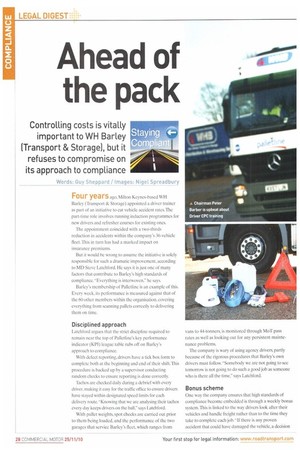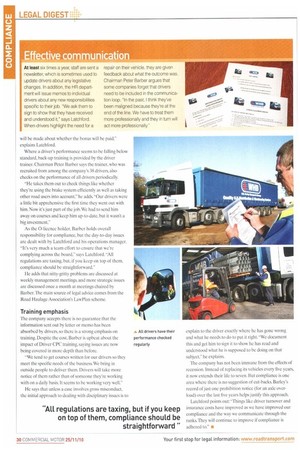Ahead of the pack
Page 28

Page 30

If you've noticed an error in this article please click here to report it so we can fix it.
Controlling costs is vitally important to WH Barley (Transport & Storage), but it refuses to compromise on its approach to compliance
Words: Guy Sheppard / Images: Nigel Spreadbury Four years ago, Milton Keynes-based WH Barley (Transport & Storage) appointed a driver trainer as part of an initiative to cut vehicle accident rates. The part-time role involves running induction programmes for new drivers and refresher courses for existing ones.
The appointment coincided with a two-thirds reduction in accidents within the company's 36-vehicle fleet. This in turn has had a marked impact on insurance premiums.
But it would he wrong to assume the initiative is solely responsible for such a dramatic improvement, according to MD Steve Latchford. He says it is just one of many factors that contribute to Barley's high standards of compliance. Everything is interwoven," he says Bailey's membership of Palletline is an example of this Every week, its performance is measured against that of the 60 other members within the organisation, covering everything from scanning pallets correctly to delivering them on time.
Disciplined approach
Latchford argues that the strict discipline required to remain near the top of Palletline's key performance indicator (KPI) league table rubs off on Barley's approach to compliance.
With defect reporting, drivers have a tick box form to complete both at the beginning and end of their shift. This procedure is backed up by a supervisor conducting random checks to ensure reporting is done correctly.
Tachos are checked daily during a debrief with every driver, making it easy for the traffic office to ensure drivers have stayed within designated speed limits for each delivery route. Knowing that we are analysing their tachos every day keeps drivers on the ball," says Latchford.
With pallet weights, spot checks are carried out prior to them being loaded, and the performance of the two garages that service Barley's fleet, which ranges from
vans to 44-tonners, is monitored through MoT pass rates as well as looking out for any persistent maintenance problems.
The company is wary of using agency drivers, partly because of the rigorous procedures that Barley's own drivers must follow. -Somebody we are not going to see tomorrow is not going to do such a good job as someone who is there all the time," says Latchford.
Bonus scheme One way the company ensures that high standards of compliance become embedded is through a weekly bonus system, This is linked to the way drivers look after their vehicles and handle freight rather than to the time they take to complete each job. -If there is any proven accident that could have damaged the vehicle, a decision
will he made about whether the bonus will be paid," explains Latchford.
Where a driver's performance seems to be falling below standard, back-up training is provided by the driver trainer. Chairman Peter Barber says the trainer, who was recruited from among the company's 38 drivers, also checks on the performance of all drivers periodically. "He takes them out to check things like whether they're using the brake system efficiently as well as taking other road users into account," he adds. "Our drivers were a little bit apprehensive the first time they went out with him. Now it's just part of the job. We had to send him away on courses arid keep him up-to-date, but it wasn't a big investment."
As the 0-licence holder, Barber holds overall responsibility for compliance, but the day-to-day issues are dealt with by Latchford and his operations manager. "It's very much a team effort to ensure that we're complying across the board," says Latchford. -All regulations are taxing, but, if you keep on top of them, compliance should be straightforward."
He adds that nitty-gritty problems are discussed at weekly management meetings, and more strategic issues are discussed once a month at meetings chaired by Barber. The main source of legal advice comes from the Road Haulage Association's LawPlan scheme.
Training emphasis
The company accepts there is no guarantee that the information sent out by letter or memo has been
absorbed by drivers, so there is a strong emphasis on Alt drivers have their training. Despite the cost. Barber is upbeat about the performance checked
impact of Driver CPC training, saying issues are now regutarty being covered in more depth than before.
"We tend to get courses written for our drivers so they meet the specific needs of the business. We bring in outside people to deliver them. Drivers will take more notice of them rather than of someone they're working with on a daily basis. It seems to be working very well:' He says that unless a case involves gross misconduct, the initial approach to dealing with disciplinary issues is to
explain to the driver exactly where he has gone wrong and what he needs to do to put it right. -We document this and get him to sign it to show he has read and understood what he is supposed to be doing on that subject," he explains.
The company has not been immune from the effects of recession. Instead of replacing its vehicles every five years, it now extends their life to seven. But compliance is one area where there is no suggestion of cut-backs. Barley's record of just one prohibition notice (for an axle overload) over the last five years helps justify this approach.
Latchford points out -Things like driver turnover and insurance costs have improved as we have improved our compliance and the way we communicate through the ranks. They will continue to improve if compliance is adhered to." •




































































































































